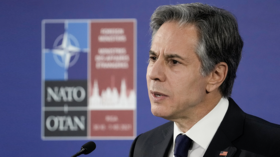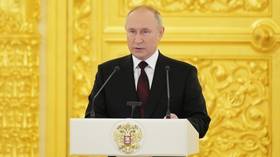NATO ready to punish Russia

NATO member states are prepared to take action against Russia should it show aggression against neighboring Ukraine, the White House’s top diplomat has announced as tensions between Moscow and the US-led military bloc run high.
Speaking at a conference in Latvia on Wednesday, US Secretary of State Antony Blinken said the organisation is "ready to take serious measures, and NATO is ready to strengthen its eastern flank."
Washington’s envoy, however, insisted the military bloc does not harbor any ill intent against Moscow. “NATO is a defensive alliance," he said. "We are not a threat to Russia... Every step we take is aimed at maintaining active protective measures of our alliance members, as well as helping our partners."
Also on Wednesday, the bloc’s secretary-general, Jens Stoltenberg, vowed that “NATO will actively contribute to building the military capabilities of Ukraine and Georgia so that they can defend themselves.”
“We are conducting exercises, sharing information, providing equipment, and supporting the reform process," he said, adding that its support for the two partner states’ “sovereignty and territorial integrity remains unwavering.”
The broadside from Blinken and Stoltenberg comes amid a standoff between the military bloc and Russia over its increased presence in Eastern Europe. Earlier on Wednesday, Russian President Vladimir Putin said Moscow will “insist on guarantees being set out to exclude the possibility of NATO moving any further to the east, and deploying threatening weapons close to Russian territory.”
Putin also stressed that “the threat at our Western borders is really growing,” remarking that the Kremlin has incessantly voiced its concerns about this.
In mid-November, Stoltenberg said NATO had registered “an unusual concentration of troops” at the Russian-Ukrainian demarcation line. According to him, Moscow “has been willing to use these types of military capabilities before to conduct aggressive actions against” Kiev.
Kremlin spokesman Dmitry Peskov slammed the accusations, saying, “the movement of our armed forces on our own territory should be of no concern to anyone.” He previously dismissed purported photographic evidence of a troop buildup because it depicted units stationed hundreds of kilometers away from the shared border, closer to Belarus.














